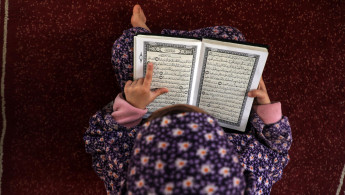Northern Cyprus sparks Turkish anger with alleged 'Quran teaching ban'
Turkish Cypriot authorities have denied there will be a ban on Quran classes, but a court ruling on religious instruction has been condemned by ally Turkey.
2 min read
The court ruling brings Quran instruction under government supervision [Getty]
A reported ban on Quran courses has put the Turkish Republic of Northern Cyprus in hot water with its benefactor Turkey, the only country in the world that recognises the self-proclaimed state.
Northern Cyprus's Supreme Court ruled on Thursday that Quran courses should be brought under control of the territory's education ministry, rather than by religious organisations .
This was which was widely but erroneously reported in the local press as an effective ban on Quran instruction.
Turkish Cypriot officials denied that the judgement prohibits Quran instruction and Northern Cyprus's Prime Minister Ersan Saner said on Friday that Quran courses would continue "after we finalise the legal amendments on the issue".
However, the Turkish Cypriot Supreme Court ruling has provoked uproar in Ankara.
President Recep Tayyip Erdogan compared the decision to policies pursued by France, which the Turkish leader has frequently lambasted in recent months as Islamophobic.
"Northern Cyprus is not a France. [It] should implement what Turkey does in all areas," Erdogan said.
The court "should learn how secularism is currently implemented in Turkey," the Turkish president said.
"Their attitude on this matter should change; until it changes, we will never tolerate steps that prevent freedom of belief and the Quran education of the children."
Turkey is officially a secular state. Religious instruction in schools focuses on Sunni Islam, however, and mosques are under the control of a state-run religious ministry.
Turkey's presidential communications director Fahrettin Altun also commented on the Northern Cypriot ruling, deeming it a "judicial coup" based on a "shallow and wrong" interpretation of secularism.
Such decisions are a "threat to the existence of the Turkish Cypriots and unity", Altun said in a series of tweets on Thursday.
Northern Cyprus is mostly Muslim but the population there is generally perceived to be less devout and more secular than in Turkey, and this has caused tensions in recent years.
If the Northern Cyprus administration does not walk back its decision, Turkey's "next steps will be different", Erdogan said.
Cyprus has been split between an internationally recognised Greek Cypriot government in the south and a Turkish-majority breakaway north since 1974, when Turkish forces invaded the Mediterranean island in reaction to an annexation attempt by Greece.
The Turkish Republic of Northern Cyprus declared independence in 1983, but Turkey is the only country in the world to recognise this.
Ankara has retained a close relationship with the territory ever since.
Northern Cyprus's Supreme Court ruled on Thursday that Quran courses should be brought under control of the territory's education ministry, rather than by religious organisations .
This was which was widely but erroneously reported in the local press as an effective ban on Quran instruction.
Turkish Cypriot officials denied that the judgement prohibits Quran instruction and Northern Cyprus's Prime Minister Ersan Saner said on Friday that Quran courses would continue "after we finalise the legal amendments on the issue".
However, the Turkish Cypriot Supreme Court ruling has provoked uproar in Ankara.
President Recep Tayyip Erdogan compared the decision to policies pursued by France, which the Turkish leader has frequently lambasted in recent months as Islamophobic.
"Northern Cyprus is not a France. [It] should implement what Turkey does in all areas," Erdogan said.
The court "should learn how secularism is currently implemented in Turkey," the Turkish president said.
"Their attitude on this matter should change; until it changes, we will never tolerate steps that prevent freedom of belief and the Quran education of the children."
Turkey is officially a secular state. Religious instruction in schools focuses on Sunni Islam, however, and mosques are under the control of a state-run religious ministry.
Turkey's presidential communications director Fahrettin Altun also commented on the Northern Cypriot ruling, deeming it a "judicial coup" based on a "shallow and wrong" interpretation of secularism.
Such decisions are a "threat to the existence of the Turkish Cypriots and unity", Altun said in a series of tweets on Thursday.
Northern Cyprus is mostly Muslim but the population there is generally perceived to be less devout and more secular than in Turkey, and this has caused tensions in recent years.
If the Northern Cyprus administration does not walk back its decision, Turkey's "next steps will be different", Erdogan said.
Cyprus has been split between an internationally recognised Greek Cypriot government in the south and a Turkish-majority breakaway north since 1974, when Turkish forces invaded the Mediterranean island in reaction to an annexation attempt by Greece.
The Turkish Republic of Northern Cyprus declared independence in 1983, but Turkey is the only country in the world to recognise this.
Ankara has retained a close relationship with the territory ever since.





 Follow the Middle East's top stories in English at The New Arab on Google News
Follow the Middle East's top stories in English at The New Arab on Google News


